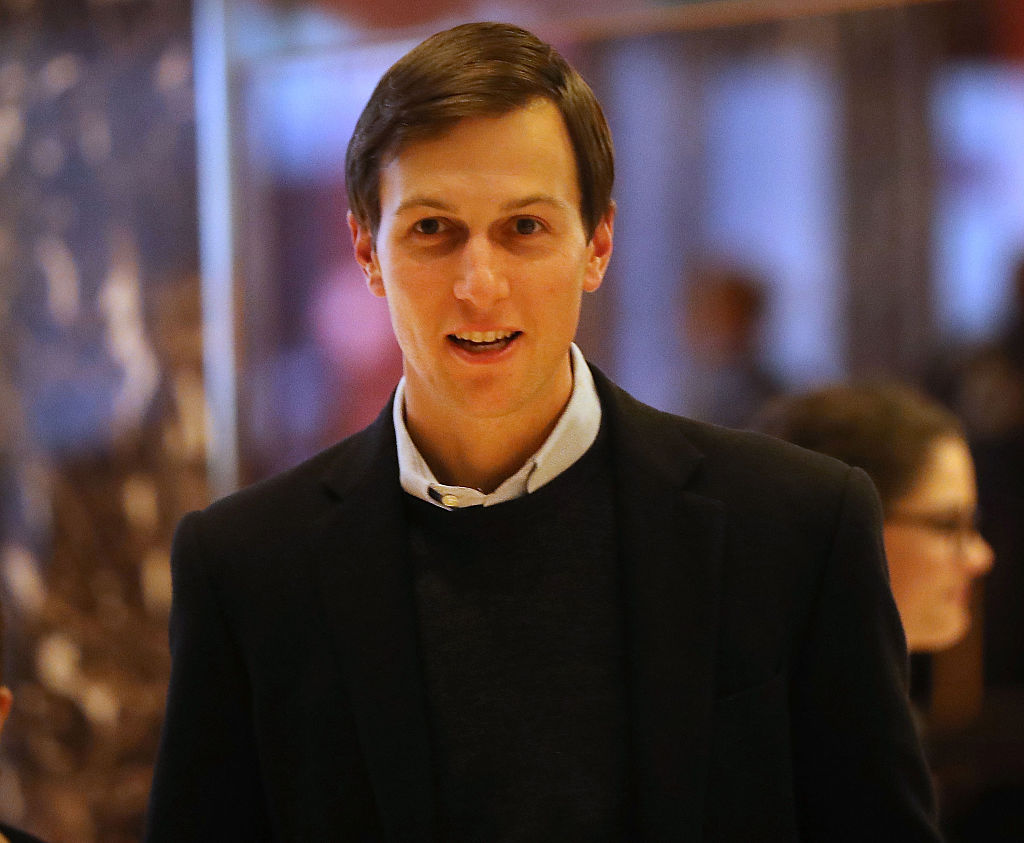Will Jared Kushner guide Donald Trump toward the center?
Democrats are pissed about Trump hiring his son-in-law. Instead, they should be thrilled.


A free daily email with the biggest news stories of the day – and the best features from TheWeek.com
You are now subscribed
Your newsletter sign-up was successful
After the GOP's November romp, many assume that Republicans in Washington have the whip hand. But the truth is, they share the whip hand — with an unreliable driver named Donald Trump. And there is a nontrivial chance that Trump will cross his party's leadership and cut a deal — on health care, and perhaps other items — with Senate Minority Leader Chuck Schumer.
Such a move would "shake up" Washington in exactly the way Trump promised on the campaign trail. It would burnish his credentials as a "dealmaker." And it would explain the Trump team's recent pledge that no one will lose health coverage as a result of ObamaCare's repeal.
If Trump does strike such a deal, it may be thanks, in part, to the cunning pragmatism of his son-in-law Jared Kushner, who will serve as a "senior adviser" to the president.
The Week
Escape your echo chamber. Get the facts behind the news, plus analysis from multiple perspectives.

Sign up for The Week's Free Newsletters
From our morning news briefing to a weekly Good News Newsletter, get the best of The Week delivered directly to your inbox.
From our morning news briefing to a weekly Good News Newsletter, get the best of The Week delivered directly to your inbox.
Such has been the hope of Kushner's rich Manhattan peers, according to Andrew Rice's long and compelling profile of the young real-estate developer in New York magazine. The theory goes that Trump "might at heart be a pragmatic dealmaker. If that were true, then maybe he could be moved by Kushner's quiet advice, and maybe all his maximalist stances — build the wall, ban the Muslims, bring on the nuclear-arms race — were negotiable."
The takeaway of Rice's piece suggests this is probably a "desperate" hope." While Kushner once passed for a businessman with "Bloombergian political values" (that is, a pro-business social moderate), the "gilded scales fell from his eyes" as he traveled the country with Trump during the campaign. Kushner came to see the country's problems through the eyes of ordinary Americans. Now, according to Kushner's future White House colleague Steve Bannon, "he really gets this grassroots populist movement in a huge way." Ultimately, New York's Rice suggests, Kushner probably can't be counted on for anything other than loyalty to his father-in-law.
But when it comes to health care, loyalty to Trump could lead to any number of outcomes.
Instead of reasoning from Kushner's (and, let's not forget, wife Ivanka Trump's) putatively centrist sympathies, let's reason from Trump's raw political needs back to his son-in-law's loyalty. Both Trump and Kushner are political novices. Neither Trump nor Kushner seems to know a great deal about the complexities of health-care policy. In February, Trump gave an embarrassingly ill-informed answer to the question of what, exactly, he planned to do about health care (it all comes down, you see, to eliminating the "lines" of competition between states and giving insurance providers more freedom to offer skimpier plans). If you asked Trump the same question today, I'd venture to say he'd offer the same answer, or something equally meaningless. (Trump's official website is also short on details.)
A free daily email with the biggest news stories of the day – and the best features from TheWeek.com
Broadly speaking, Trump holds no brief for the ideological attachments of House Speaker Paul Ryan and the conservative movement. During the primary, Trump brushed off concerns that the Republican establishment had not fallen in line. Party unity was a nice-to-have, rather than a need-to-have, kind of thing: "Don't forget, this is called the Republican Party. It's not the Conservative Party," Trump said.
Trump could not explain, and probably does not care to learn, the difference between positive liberty and negative liberty; the idea of debating whether access to health coverage is a "right" or a "privilege" would no doubt seem sophomoric to the easily bored and bottom-line-focused Trump.
And remember, the congressional GOP has shown that it's easily brought to heel. Last week, House leaders quickly dropped a plan to gut the authority of an independent ethics panel after a backlash from Democrats, angry constituents, and outside watchdog groups, plus a skeptical tweet from The Donald himself. If Trump knifed his party in the front over something as comparatively trivial as the OCE, imagine how quickly he would sour on an ugly battle over health care that threatened to rob millions of Americans of insurance.
It's here that Kushner's loyalty to Trump — a commitment to building his popularity and maintaining his connection to ordinary Americans — would militate against advising in favor of a bruising, ideologically motivated game of chicken with Democratic lawmakers.
What would a "pragmatic deal" with Schumer on ObamaCare look like? It's easy enough to imagine the scrapping of the employer mandate as well as the permanent elimination of the medical device tax. The individual mandate may also be traded for something like automatic enrollment in a randomly chosen health plan, with a clause allowing enrollees to opt out of the plan if they choose. The hated "Cadillac tax" on the most comprehensive employer health plans could also end up on the ash heap.
ObamaCare, but with fewer "pay-fors": That's what TrumpCare may look like. And Kushner, a trusted moderate adviser with Trump's ear, could get the president there.
What about the ensuing increase in deficits?
There's nothing in Trump's plan on tax cuts or infrastructure to suggest he's worried about deficits — and Schumer's Democrats may decide they can live with them if it means Americans don't lose coverage.
If Kushner does indeed view issues through the eyes of ordinary Americans; if he has his father-in-law's political interests at heart above all else; and if he understands the "grassroots" like Steve Bannon says he does — then Kushner's voice might be the one whispering to Trump, "Take the deal."
Scott Galupo is a freelance writer living in Virginia. In addition to The Week, he blogs for U.S. News and reviews live music for The Washington Post. He was formerly a senior contributor to the American Conservative and staff writer for The Washington Times. He was also an aide to Rep. John Boehner. He lives with his wife and two children and writes about politics to support his guitar habit.
